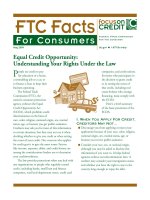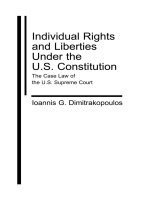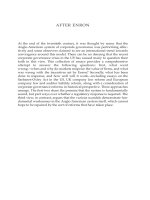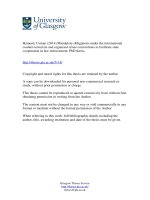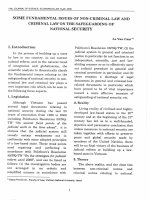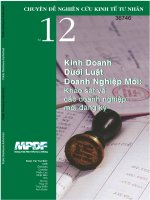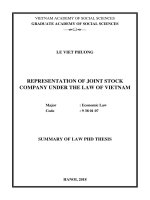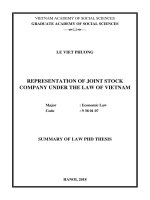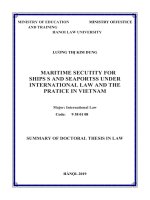Compare fundamental breach under the us law,vietnam law and the cisg
Bạn đang xem bản rút gọn của tài liệu. Xem và tải ngay bản đầy đủ của tài liệu tại đây (1.58 MB, 20 trang )
<span class="text_page_counter">Trang 1</span><div class="page_container" data-page="1">
<b>TRƯỜNG ĐẠI HỌC LUẬT THÀNH PHỐ HỒ CHÍ MINHKHOA CÁC CHƯƠNG TRÌNH ĐÀO TẠO CHẤT LƯỢNG CAO</b>
<b>FUNDAMENTAL BREACH UNDER THE US LAW,VIETNAM LAW AND THE CISG</b>
Bộ môn: Law of Contract
</div><span class="text_page_counter">Trang 2</span><div class="page_container" data-page="2">3. CISG (Convention on Contracts for the International Sale of Goods)...5
<b>III. Reference documents...9</b>
</div><span class="text_page_counter">Trang 3</span><div class="page_container" data-page="3"><b>I.A definition of fundamental breach in US, Vietnam and CISG I.1.Vietnamese Law:</b>
Article 3(13) of Law on Commerce 2005 presents that fundamental breach means breach of contract by one party causing loss to the other party to the extent that such other party is not able to achieve its objective of entering into the contract .<small>1</small>
<b>I.2.US Law: </b>
The US law doesn’t stipulate obviously and directly the definition of fundamental breach, but Restatement (Second) of Contracts 1981 refers to the term “material breach”. It is similar to the term “fundamental breach”. However, it is used more commonly than the term “fundamental breach” in US law.
A “material breach” which is defined by Westlaw from the provisions of Article 241 of Restatement (Second) of Contracts is a breach that is serious enough to justify the other party in abandoning the contract. A “material breach” is one that substantially defeats the purpose of the contract, or relates to an essential element of the contract, and deprives the injured party of a benefit that he or she reasonably expected.
<b>I.3.CISG: </b>
Article 25 of CISG 1980 regulates that a breach of contract committed by one of the parties is fundamental if it results in such detriment to the other party as substantially to deprive him of what he is entitled to expect under the contract, unless the party in breach did not foresee and a reasonable person of the same kind in the same circumstances would not have foreseen such a result .<small>2</small>
These definitions of fundamental breach are based on a breach of a contract and the significant and serious impact of the consequences of the conduct breach by one party against what the parties expected to achieve from the contract .<small>3</small>
The first criterion is the basis for determining the level of serious impact on the expected benefits from the contract. It is different depending on the legal regulations of each country or international. For example, Vietnam <small>1 Law on Commerce section 3(13)</small>
<small> picc1658240480.html</small>
<small>3 Võ Sỹ Mạnh. (2015). VI PHẠM CƠ BẢN HỢP ĐỒNG THEO CÔNG ƯỚC VIÊN NĂM 1980 VỀ HỢPĐỒNG MUA BÁN HÀNG HÓA QUỐC TẾ VÀ ĐỊNH HƯỚNG HOÀN THIỆN CÁC QUY ĐỊNH CÓ LIÊN</small>
</div><span class="text_page_counter">Trang 4</span><div class="page_container" data-page="4">law determines the level of the damage in relation to the purpose of entering into the contract. The US law bases on an essential element of the contract which is stipulated in Article 241 of Restatement (Second) of Contracts. The CISG is based on substantial prejudice and results in a substantial deprivation of what the aggrieved party is entitled to expect from the contract unless the breaching party could not have foreseen it and a reasonable person would not have foreseen consequences if they were in a position and similar circumstances.
The second criterion is that the breaching party and a reasonable person of the same kind in the same circumstances would not have foreseen such a result. The CISG is more advanced than Vietnam law and the US law when it takes into account both the interests of the person suffering the damage and the person causing the damage because it considers objective factors that make it impossible for them to predict that damage will be caused .<small>4</small>
<b>II.Elements of fundamental breach in US, Vietnam and CISG and case laws</b>
There is no requirement that fundamental breach must contain the specific terms. Through the definition of fundamental breach in Vietnam law, we conclude that fundamental breach must contain two following terms:
One party causes loss to the other party to the extent that such other party is not able to achieve its objective of entering into the
(a) the extent to which the injured party will be
<b>deprived of the benefit</b>
which he reasonably expected;
(b) the extent to which the injured party can be the CISG. However, the CISG does not provide a specific explanation to
fundamental breach must contain. From the provision of Article 25, it shows that
<b>fundamental breach mustcontain the following</b>
<small>4 Bùi Thị Bích Sơn. (2011). Tuyên bố hủy hợp đồng và hậu quả pháp lý của việc hủy hợp đồng mua bán hàng hóa quốc tế theo Công ước Viên 1980 và Luật thương mại 2005. Khóa luận tốt nghiệp. Đại </small>
<b>Too long to read onyour phone? Save to</b>
read later on your computer
Save to a Studylist
</div><span class="text_page_counter">Trang 5</span><div class="page_container" data-page="5">The other party fails to achieve its objective of entering into the tapioca starch products to Company B and the two parties agree on quantity, quality, delivery time... And two If the parties agree, any party that violates the contract will be fined 8% of the value VND, the order was signed and confirmed by Company S N. After that, the company announced a request to S N company to deliver the
benefit of which he will
(c) the extent to which the
<b>party failing to perform</b>
or to offer to perform will suffer forfeiture; (d) the likelihood that the
party failing to perform or to offer to perform will cure his failure, taking account of all the circumstances including
(e) the extent to which the behavior of the party failing to perform or to offer to perform comports with standards
<b>of good faith and fairdealing.</b>
<b>Facts: The Defendant (Mr</b>
Wallis) agreed to buy a used car if the vendor was able to find a company with which the Defendant could enter into a hire-purchase agreement. The vendor found such a company (the Claimant). Once the agreement was entered into, the Defendant inspected the vehicle he had agreed to purchase through the hire purchase agreement and found that it had been substantially altered from the version he had previously seen and agreed to buy. Namely, the radio was missing, as were the chrome strips around the
2. A breach that causes the detriment that substantially deprives the other party of what he was entitled to expect under the contract. 3. The detriment could
have been foreseen
considered a good example of using the criterion of
Delchi for use in room air conditioners. Before signing the contract, Rotorex sent Delchi a compressor model with technical details about performance. However, while the second shipment
</div><span class="text_page_counter">Trang 6</span><div class="page_container" data-page="6">goods, but S N company confirmed the notice and responded that it could not meet the order, informing company B that it was facing many difficulties due to the source of raw materials. input is unstable and scarce.
Company B requested Company S N to pay a fine for breach of contract and compensate for damages totaling 800,000,000 VND. S N Company agreed to pay a fine and compensate the plaintiff a total of 800,000,000 VND. => Proves that company S N caused damage to the company to the extent that company B did not have enough goods to use as raw materials for production A problem arose between the two parties that was not as previously agreed, leading to the failure to achieve the purpose of entering into the contract due to the delivery being incorrect in quantity and
body, the new tires had been replaced by old ones, the bumper was not held together with rope and perhaps most importantly, the car could not start. The Defendant therefore refused to pay for the car. The hire purchase agreement contained an exclusion clause which stated that ‘No condition or warranty that the vehicle is roadworthy or as to its age, condition or fitness for any purpose is given by the owner or implied herein.’
<b>Decision: It was held that</b>
Karsales was under an obligation to provide a car which is in substantially the same condition as when Mr Wallis inspected it. This is particularly the case for hire purchase agreements where the purchaser had previously inspected the vehicle. More broadly, where there is a fundamental breach of a contract, a party cannot rely on an exemption clause. Not in the least, the Sale of Goods Act 1979 would still imply a term into the contract that the goods will be fit for purpose which cannot be excluded through
<i>such a clause. Based– on</i>
<i>Karsales (Harrow) v Wallis</i>
was on its way to Delchi, Delchi discovered that a large number of compressors from the first shipment were of a quality that did not conform to the samples and accompanying specifications. Specifically, Rotorex discovered that up to <b>93%</b> of delivered air conditioner compressors had weak cooling ability and consumed more power than the samples and technical details accompanying the samples. The Federal <b>Court</b> of Appeals upheld the judgment of the New York Court and held that the seller had fundamentally breached the contract because the cooling capacity and power consumption of the air conditioner were important factors in determining the price. product quality value.
<small>8</small>Case:
Facts: In January 1988, Rotorex Company agreed to sell 10,800 air compressors to Delchi Company for use in room air conditioners. Before signing the contract, Rotorex sent Delchi a compressor model with technical details about performance. However,
</div><span class="text_page_counter">Trang 7</span><div class="page_container" data-page="7">time due to a force majeure event arising and both parties Failure to agree on compensation due to force majeure events leads to disputes
In the contract between Mr.
Wallis and Karsales, the car which Mr. Wallis agreed to buy was the one he had previously inspected. So that, it is reasonable when Mr. Wallis expected to receive that car and its benefit. However, once the agreement was entered into, Mr.Wallis inspected the vehicle he had agreed to purchase through the hire purchase agreement and found that it had been
<b>substantially altered from</b>
the version he had previously seen and agreed
<b>to buy. Namely, the radio</b>
<b>was missing as were the</b>,
<b>chrome strips around thebody, the new tires hadbeen replaced by old ones,the bumper was not heldtogether with rope andperhapsmostimportantly, the car couldnot start. </b>
In conclusion, Mr. Wallis
while the second shipment was on its way to Delchi, Delchi discovered that a
compressors from the first shipment were of a quality that did not conform to the samples and accompanying specifications. Specifically, Rotorex discovered that up to 93% of delivered air conditioner compressors had weak cooling ability and consumed more power than the sample products and technical details attached to the samples. Decision: The Federal Court of Appeal held that the rate of 93% of the goods being of a quality that did not conform to the contract provisions in relation to the total contract value was a very significant injury and that such breach of contract
<small>6 4 Robert Koch, The Concept of Fundamental Breach of Contract under the United Nations Convention on Contracts for the International Sale of Goods (CISG), REVIEW OF THE CONVENTION ON CONTRACTS FOR THE INTERNATIONAL SALE OF GOODS (CISG), 1998, KLUWER LAW INTERNATIONAL 177, 261 (1999), available at </small>
<small> </small>
<small>7 Ana Paula S. C. Rizzo de Barros, Definition of Fundamental Breach under CISG’s Art. 25 and Analysis of Recent Case Law ,,page 16, 17, </small>
<small>8</small>Thanh Thanh, “Fundamental breach under CISG", Viet Nam lawyer journal, 18th January 2021
</div><span class="text_page_counter">Trang 8</span><div class="page_container" data-page="8"><b>was deprived of the</b>
1. Rotorex delivered air-conditioners which were not proper for the had weak cooling ability and consumed more power than the sample products and technical details attached to the samples. 93% was the substantial deprivation and led to Delhi losing what they expected from the contract.
3. The air conditioner is the subject of the contract, so it is clearly agreed upon by the parties. There is
One party causes loss to the other party.
The detriment resulting from the breach must extensively hamper the legitimate contractual expectations of the aggrieved party.
DIFFERENCES:
There is no foreseeability in Vietnam law and US law whereas a breach that causes a detriment that substantially deprives the other party of what he was entitled to expect under the contract is not a fundamental breach if the detriment could not have been foreseen by the defaulting party, and by a reasonable person of the same kind under the same circumstances of the breaching party under the CISG’s interpretative rules.
</div><span class="text_page_counter">Trang 9</span><div class="page_container" data-page="9">The US law refers to the likelihood that the party failing to perform or to offer to perform will cure his failure and the extent to which the behavior of the party failing to perform or to offer to perform comports with standards of good faith and fair dealing while Vietnam law and the CISG doesn’t point out that.
Under US law, in determining whether a failure to render or to offer performance is material, the innocent party's benefit which they want from the contract must be reasonably expected which was shown through Article 241(a) of Restatement (Second) of Contracts 1981. Meanwhile, Vietnam law and CISG only seem to stipulate that what is harmed is what the innocent party aims or expects to achieve when entering into the contract, without mentioning the reasonableness of that aim or expectation.
<b>III.Conditions to be excluded from liability for fundamental breach</b>
Acording to Article 294 (1) of Law on Commerce 2005 there are following conditions:
Upon occurrence of any event which the parties have agreed will give rise to immunity from liability;
Upon occurrence of an event of force majeure; Upon a breach by one party which was due to the fault of the other party;
Upon a breach by one party which was due to implementation of a decision of a competent State administrative body of which the parties could not have known at the time.
Exclusion of liability clauses;
Other principles stipulate under the law.
Through the process of studying cases, it can be seen that the parties can stipulate exemptions from fundamental violations through the terms of the contract
Failure was due to an impediment beyond the party’s control;
Failure by a third person whom he has engaged to perform the whole or a part of the contract;
The party who fails to perform must give notice in a reasonable time to the other party of the impediment and its effect on his ability to perform.
3 different law systems illustrate hardship and force majeure.
<b>DIFFERENCES:</b>
</div><span class="text_page_counter">Trang 10</span><div class="page_container" data-page="10">In Vietnam law and the US law, there are provisions to be excluded from liability that the parties have agreed will give rise to immunity from liability and a breach by one party which was due to the fault of the other party while the CISG does not provide that. The CISG makes a request that the party who fails to perform must give notice in a reasonable time to the other party whereas vietnam law and the US law don’t regulate an obligation of notice to the aggrieved party.
The CISG is more advanced than vietnam law and the US law when there is protection for the party breaching the contract because of the third person’s fault; however, it doesn’t refer to the fault of the other party which is a condition of exclusion liability .
<b>4. Legal consequences of fundamental breach in US, Vietnam and CISG:</b>
A. Law
</div>